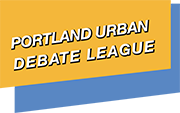About the Portland Urban Debate League
Our Mission & Values
Our Mission
To address opportunity gaps in education and empower students through competitive policy debate to become engaged learners and critical thinkers who are effective advocates for themselves and their communities.
Our Vision
To create a thriving debate community, in which engaged students are partnered with trained coaches, the Portland Urban Debate League provides workshops and evidence to students, continuing education and curricular materials to coaches, and debate competitions with experienced judges throughout the school year. These resources are free or low-cost for member schools and available for purchase by non-member schools. The PUDL is committed to sharing expertise and ideas between programs, to mentoring and support, and to further discussions about debate and education. The PUDL also connects students to college and further education and leadership opportunities.
Our Values
Equity: Debate is a valuable education opportunity that should be available to all students, whatever the resources a school has. The PUDL provides the most resources to the poorest schools first.
Openness: All debaters benefit from a strong community. The PUDL has open walls, allowing member and non-member schools to participate in events, and seeks to make connections between PUDL schools and other debate leagues and debate organizations whenever possible.
Diversity: Debate and discussion are best served by hearing voices from multiple diverse backgrounds. Racial, social, gender and sexual orientation, ideological, and economic diversity in participants enriches and strengthens the activity. The viewpoints of students, teachers, and judges are welcomed in the PUDL education advisory board.
Feedback: Debaters benefit from clear and expert feedback from coaches and judges. Coaches and judges also benefit from discussions with debaters. Feedback is a dialogue. A community grows from an open dialogue that holds each participant to high standards of civility, communication, and critical thinking.
Engagement: Debaters benefit from reading thoroughly on a topic, from thinking deeply about it, and from feedback on how to improve their arguments. Their coaches can foster student engagement with demanding curricula and lessons that require high levels of thinking. Debate is a captivating activity that causes students to rise to the highest of expectations.
Critical Thinking: Understanding contrasting viewpoints, thinking about authors’ motives, determining the evidence and support for arguments, and seeing the historical context and effects of ideas are crucial thinking skills that are not always taught in schools. Debaters deserve the opportunity to analyze and synthesize multiple, differing ideologies as they develop their own understandings of the world.
Citizenship: Through participation, debaters learn about important political and social topics. They will learn to be more critical consumers of news and the media. The PUDL encourages students to become engaged citizens and leaders.

